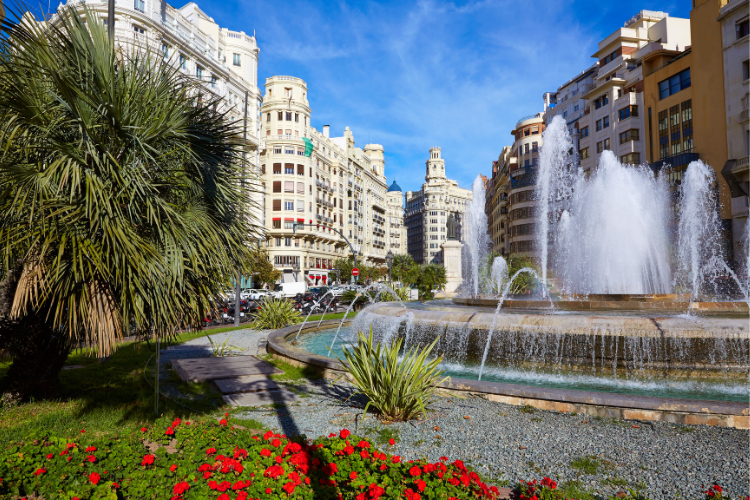Last Updated on January 10, 2025 by Maryam Siddiqui
The search continues! Digital Nomads like you are always looking for more places to explore, live in, and call home. We know it can’t be just any place. It needs to have the amenities you need to make all the effort worth it. After much research, here are the top 5 cities to work remotely in Spain – backed by Digital Nomads!

Working remotely and living in Spain means you get to maximize all the perks of this beautiful country while saving up what you would spend in other expensive places. While major cities are still very popular, the lifestyle in Spain continues to attract digital nomads from all over the world.
Let’s dive into all you need to know about how to get a digital nomad visa, the requirements, and the top cities to work remotely in Spain!
The Top Places To Work Remotely In Spain
Before we begin talking about the top cities, it’s important to keep in mind that you may not love a place that another digital nomad does. The cities are listed in no particular order, and we highly recommend that you do thorough research.
Since you’re likely to spend a year working remotely in Spain, there are a lot of things you may want to consider.
Here’s a summary of what each city offers!
Madrid
Madrid, the famous capital of Spain, is a prime destination for remote workers and digital nomads. The city is home to a thriving digital nomad community, making it easy to connect with like-minded professionals and find coworking spaces tailored to your needs.
Due to the high influx of tourists, the growing economy, and technological advancements, Madrid’s infrastructure is top-notch. As a digital nomad, you will never have to worry about reliable high-speed internet, efficient public transportation, and other amenities.
While Madrid is a metropolis, it offers a relatively affordable cost of living compared to other major European cities. A one-bedroom apartment outside of the city center costs €984, and a single person’s living cost (without rent) is around €807.
Why do most remote workers end up staying in Madrid? The explanation is simple. Just like Portugal’s capital Lisbon, or Thailand’s capital Bangkok, Madrid offers a dynamic lifestyle and endless networking opportunities.
The city hosts tech conferences and workshops for entrepreneurs, investors, and remote workers. South Summit is a famous one; it’s an annual conference that brings together startups, investors, and corporations. The dates for the conference in 2025 are already up on the website in case you’re interested!
- Read all about Madrid: Living In Madrid: An Expat’s Perspective For Relocation.
Barcelona
Another digital nomad favorite!
Barcelona is not just about gazing at architecture and the Mediterranean charm; it’s a fantastic choice for remote workers.
A lot like Madrid, the digital nomad community benefits from many opportunities for networking and collaboration. You can even find your community on platforms like Remote Work Community or other Facebook groups.
And events such as the DigiMarCon Spain 2024 are excellent opportunities to network and make friends. Given the huge digital nomad community, Barcelona is home to many coworking spaces, such as OneCoWork and Aticco.
If you’re not someone who likes coworking spaces, you’ll find cozy cafés with high-speed internet and plenty of spots to stay productive.
Coming to the cost of living, while it is slightly higher than in other Spanish cities, it remains affordable compared to many European capitals. The diverse neighborhoods also offer a range of accommodation options to suit different budgets and preferences.
To give you some context, a studio flat in Aragón has a monthly rent of €715 and a one-bedroom flat in Passatge de Lluís Pellicer costs €1,450 monthly..
- What is living in this city like? Read more: Living In Barcelona: Everything Expats Need To Know.
Valencia
This city will win your heart if you love Spanish culture but want to avoid big cities like Madrid and Barcelona!
Valencia’s digital nomad community is rapidly growing, along with coworking spaces and networking events. Valencia’s infrastructure is well-developed, with reliable high-speed internet and an efficient public transportation system.
Spaces like Vivarium in Valencia offer coliving and coworking spaces that allow you to build a supportive community, attend networking events, and live in peace.

Again, if you’re not someone who would like to work or live in such an arrangement, you can choose your own accommodation and work from cafes like Bluebell Coffee and Ubik Cafe.
Bluebell Coffee is a quiet, secluded space with reliable Wi-Fi during weekdays. Ubik Cafe offers a different vibe than a bookstore, with a coffee shop and good Wi-Fi. It also hosts different events throughout the week.
Another reason why Valencia tops the list is because of its relaxed yet dynamic atmosphere. It’s definitely a great place to work remotely in Spain. The city’s Mediterranean climate and abundant green spaces provide a perfect setting for a balanced lifestyle.
Seville
Known for its Moorish architecture and flamenco, Seville provides an inspiring backdrop for remote workers.
Seville is a small city with a completely different vibe from Madrid and Barcelona. People here prefer peace and quiet and a slow pace of life.
Nonetheless, it’s a good city for digital nomads because of the availability of coworking spaces like Arcadia Coworking, which is in the center of Seville. It offers day passes and monthly memberships. It’s a well-lit space with amenities like phone booths, a multipurpose room, and a kitchen.
Despite being slow-paced, it’s not like the digital nomad community in Seville is entirely out of touch with each other. Platforms such as InterNations regularly organize events for expats to connect with locals in Seville.
One thing that stands out about Seville is the cost of living. While Spain is already a lot more affordable than the countries digital nomads leave from, Seville, in particular, is a lot less expensive.
You can find pretty good one-bedroom apartments in €630, while the cost of living apart from rent (for a single person is €712. It’s safe to assume that €2,000 will enable you to live comfortably in Seville.
Remote workers get a chance to immerse themselves in the local way of life in Seville. From festivals like Feria de Abril to the Semana Santa processions, there’s always something to experience.
Let’s Move to Europe
With Viv Europe your plans for Europe will come to a reality
Malaga
Onto the last one! Malaga is definitely one of the best cities to work remotely in Spain.
Renowned for its beautiful beaches and warm climate, Malaga offers an enviable lifestyle for remote workers. The city has a burgeoning digital nomad community and an increasing number of coworking spaces with sea views.
Monday Muelle Uno and Smart Work Plaza are two famous ones. In addition to conventional work-related events, these spaces organize sessions to meet like-minded digital nomads and socialize or relax.
Similar to Seville, the cost of living in Malaga is decent, with a monthly rent of €766 and other expenses totaling €677. It also has its thriving art scene, highlighted by the Picasso Museum and numerous galleries, providing a culturally rich environment for creative inspiration.
If you want to live in a relaxed and scenic coastal city, Malaga might be perfect for you!
- More about Living In Malaga: An Expat Favorite.
Why should I consider moving to Spain and keeping my remote job?
While it all comes down to personal preferences, we can quote rankings that prove that Spain is a favorite among digital nomads.
The Digital Nomad Index by VisaGuide ranks Spain as the best country for remote workers. This index takes into account visa regulations, internet speed, taxation policies, cost of living, etc. It’s a close competitor to Portugal, which is another top destination.
What’s important to note, however, is that the minimum financial requirement for Portugal’s Digital Nomad Visa is higher than Spain’s. For Spain, you need to show an income of €2,400 per month, while for Portugal, it is €3,200 as of 2024.
With a sunny climate, rich culture, and affordable cost of living, Spain provides a perfect environment. You can experience diverse cuisine, stunning landscapes, and a laid-back lifestyle.
Hundreds of remote workers make this very tough decision every year. The ones that live in Spain love every bit of it!
Let’s talk about a few reasons why they do.
Thriving Expat Community and Remote Work Infrastructure
Whether you choose to live in a metropolitan city or a tranquil coastal town, you’ll find support networks, social clubs, and events designed to help expats integrate and thrive.
To illustrate, in Barcelona or Madrid, numerous expat groups and meetups are organized regularly. These vary from roundtables to sessions, and you can find a list of ongoing events here.
However, coastal towns have smaller dedicated expat associations that organize social gatherings, cultural activities, and community support. Like the Málaga Digital Nomads in Malaga is an active community that organizes meetups and events. They collaborate with local community centers to provide support and activities tailored to expats and remote workers.
Spain’s remote work infrastructure is impressive, with numerous coworking spaces, reliable high-speed internet, and modern amenities that cater to remote professionals. So, if you prefer working from a beachfront café or a chic urban coworking hub, the country offers diverse options to suit your needs.

High-quality lifestyle & Low cost of living
As mentioned earlier, Spain offers a high-quality lifestyle with a surprisingly low cost of living. Here are some average values:
| Expense Type | Cost |
|---|---|
| Apartment (1 bedroom) Outside of Centre | €721 |
| A single person estimated monthly costs (without rent) | €712 |
| Apartment (3 bedrooms) Outside of Centre | €1,072 |
| A family of four estimated monthly costs (without rent) | €2,512 |
Spain also excels in providing excellent healthcare, top-notch public services, and a variety of leisure activities. Fresh produce and dining out are inexpensive, allowing for a healthy and enjoyable diet.
Lastly, the country’s efficient public transport system reduces the need for personal vehicles, further saving costs.
Entertainment & Beautiful Landscapes
The diverse landscapes, beaches of the Costa del Sol, rugged Pyrenees mountains, and more offer endless opportunities for outdoor adventures. And let’s not forget the rich cultural scene with world-class museums, historic sites, and vibrant festivals!
Barcelona and Madrid offer buzzing nightlife, while quaint villages provide serene getaways. When you work remotely in Spain, you get to live a dynamic lifestyle filled with entertainment and breathtaking scenery.
Do I need a visa to live in Spain?
Yes, if you want to live for under 90 days, you need a Schengen Visa (for specific countries). And if you want to live for over 90 days, you need a long-term residence visa.
Here’s an overview of all the visa types:
- Work Visa: It allows you to legally live and work in Spain, but you must secure a job offer from a Spanish company before applying.
- Business Visa: This is used by people who need to conduct business activities in Spain.
- Digital Nomad Visa. This is designed for remote workers employed by companies outside Spain or freelancers with international clients. This Visa allows you to work remotely from Spain for up to a year, with the possibility of renewal.
- Non-Lucrative Visa. This is ideal for those who can financially support themselves without working in Spain. This Visa is popular among retirees and people with passive income sources.
- Golden Visa. This Visa is aimed at investors and is issued to those who invest a specific amount in Spanish real estate, businesses, or government bonds. It offers residency and benefits for the investor and their family.
Remember to check the latest requirements and processes from the Spanish consulate or embassy in your country. If you have specific questions or need help with your application, feel free to reach out to Viv Europe!
Which Visa allows me to work remotely in Spain?
The Digital Nomad Visa allows all foreigners to live and work remotely in Spain for up to 1 year, with a possibility of renewing your Visa.
This Visa caters specifically to remote workers who are employed by companies outside Spain or who have international clients as freelancers.
Take a look at some of the features of this visa type:
- Must show you earn €2,400 per month, for at least 3 months.
- Have access to comprehensive health insurance coverage in Spain.
- The application process involves submitting documents like proof of employment or freelance contracts, income statements, etc.
Read all about the famous Spain Digital Nomad Visa: How To Work Remotely In Spain to learn more!
Do you want to become a Digital Nomad in Spain?
If you’ve made it this far, the answer is probably yes!
Let’s take it step by step and break down the process for you. Living and working remotely in Spain requires planning, even if it is not a permanent relocation. Schedule a commitment-free consultation with Viv Europe and ask all the questions you need to.
See you soon!





